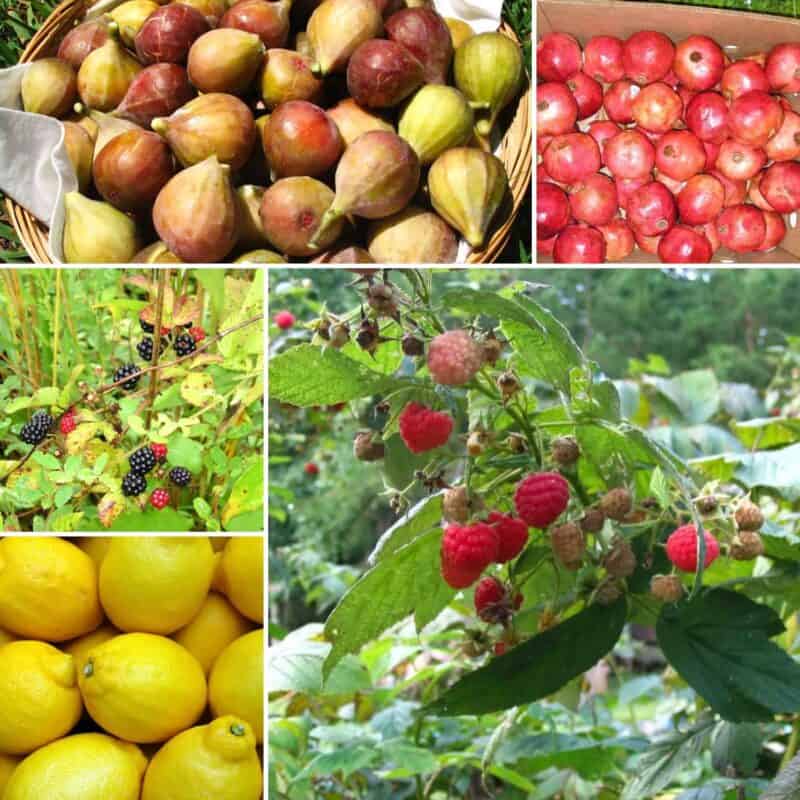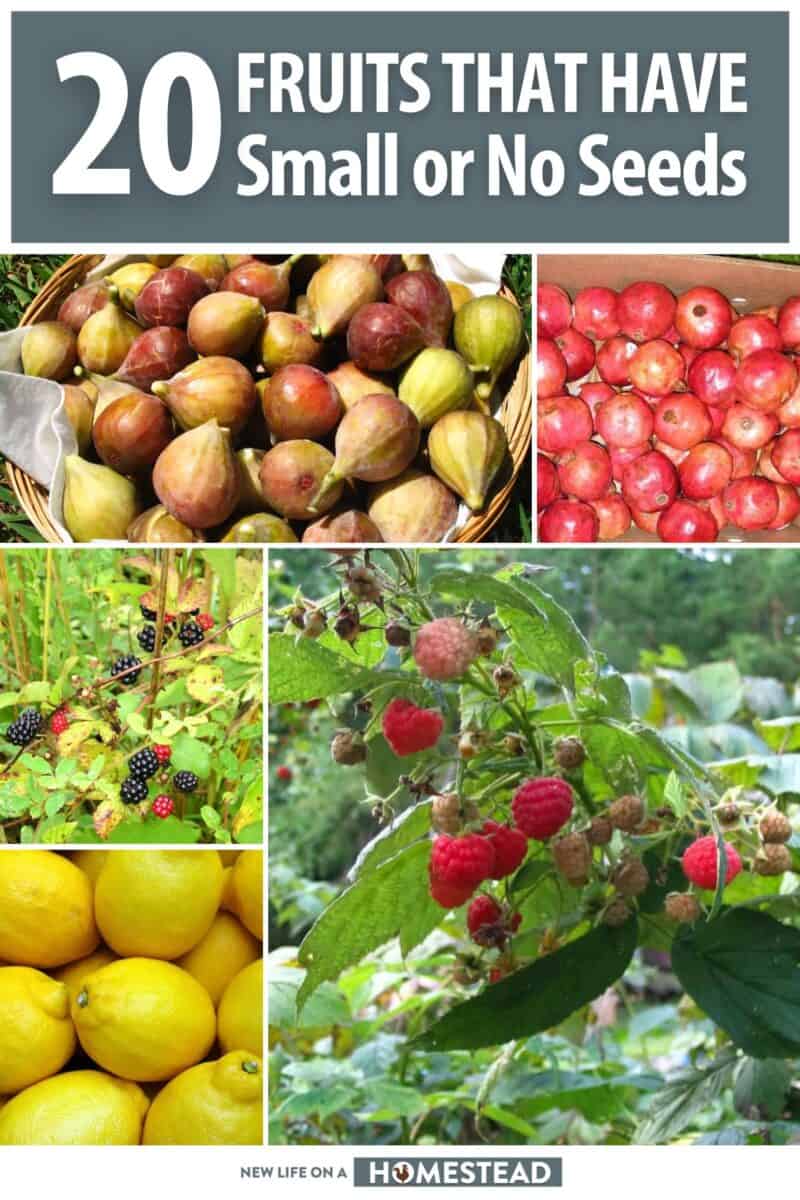The life of nearly every plant starts with a single seed. It’s pretty miraculous when you think about it. But that is going to be of no comfort if you run into a seed when snacking on fruit, or if a relative finds one in your homemade pie!

If you’re tired of dealing with annoying seeds while trying to enjoy or use a perfect piece of fruit, you can always choose fruits that have only one seed that is easy to remove.
But today I’m bringing you 20 delicious and nutritious fruits that are seedless and ready to eat as-is or be put to use in all sorts of recipes.
To clear up one quick thing before we go on, some of the fruits on this list are not truly seedless.
That’s right: they might indeed have seeds, but they’re so tiny or even chewable that the fruit is effectively seedless for all practical purposes – including eating out of hand and cooking!
So, with that in mind, let’s get on to the list.
1. Bananas
The single most popular tropical fruit in the world, though no longer the delicacy it was once considered.
Bananas are virtually seedless as any seeds they do have are so small they are almost undetectable.
Those tiny black specks you see in the center after cutting one? That’s them.
Bananas are packed with essential nutrients such as potassium, fiber, and vitamin C. They are a great snack on their own or can be used as a sweet addition to smoothies or oatmeal.
2. Kiwis
One of the most interesting tropical fruits, and also one with a flavor that is highly variable. Some are quite tart, while others can be extremely sweet.
Kiwi also has a unique texture with its fuzzy skin and juicy interior hiding edible seeds that are too small to worry over.
A serving of kiwi contains more than the recommended daily dose of vitamin C, potassium, and fiber. Kiwi pairs perfectly with berries in a fruit salad, or can be enjoyed on its own as a refreshing snack.
3. Raspberries
Among the most popular berries out there, and these have teeny tiny seeds that add a lovely little crunch to jams, jellies and preserves.
At least, until one gets annoyingly stuck between your teeth! Raspberries are high in antioxidants and vitamin C, and are perfect for adding to smoothies, yogurt, or as a simple and healthy snack eaten out of hand.
Take care with wild varieties: their seeds might be big enough to cause a little trouble if you bite down on them.
4. Blackberries
Blackberries are really just bigger and sweeter raspberries, with a slight tartness. These have seeds that can be noticed but are still edible and much smaller than the ones found in other fruits.
They’re also jam-packed with vitamin C, fiber, and antioxidants which help to fight off disease in the body.
Blackberries make for a delicious snack as-is or can be made into superlative jam or preserves. Blackberries are sometimes truly seedless, with a variety called Thornless Blackberry being popular among growers.
5. Blueberries
Perfectly ripe, plump blueberries are one of life’s greatest pleasures, and this is one pleasure you won’t need to worry over seeding.
While most blueberries do contain seeds, they are too tiny to hurt you, and are entirely edible.
Some varieties of truly seedless blueberries are now available if you want to completely eliminate them from your pies, jellies, and other desserts.
Blueberries are loaded with antioxidants, fiber, and vitamin C, and make a healthy and delicious snack on their own, too.
6. Strawberries
There is hardly any fruit on this list that contains more seeds than a strawberry, and you’ve been eating them all your life. True story!
They are all over the outside of the berry, those little golden or brown divots your see. That’s the seeds! Although all strawberries have seeds on their exterior, all are practically seedless.
Strawberries are rich in fiber, vitamin C, and folate, and are perfect for adding to smoothies or making homemade jam.
7. Grapes
Grapes can have seeds or be seedless, but seedless grapes are a common supermarket staple, as they make for easy snacking without the hassle of seeds.
Grapes are packed with antioxidants and vitamins, and are always a wonderful addition to any cheese board or fruit salad.
8. Watermelon
There are more watermelon cultivars out there than you can shake a stick at. Watermelon is full of hydrating water, vitamin A, and vitamin C, and is perfect for a refreshing summer snack.
Some have seeds, some don’t and some are variable depending on how they are bred and whether or not they are pollinated.
While seedless watermelons may not be truly seedless, the seeds are usually so few that they are easy to spot or remove, and are often totally absent.
9. Pineapple
Banana might be the most common tropical fruit, but pineapple is still the undisputed king. This juicy tropical fruit is naturally seedless depending on the variety, and almost all commercial cultivars are entirely or practically seedless.
This delicious fruit pairs well with savory dishes or serves as the prime ingredient in all kinds of desserts, and it also contains bromelain, an enzyme that can aid in digestion and reduce inflammation.
10. Oranges
Some of you are bound to raise a hand over this one, but I have included oranges for a good reason.
Popular oranges come in seedless varieties, including some of the most popular such as the Navel Orange.
A popular choice for snacking and juicing, oranges are high in vitamin C, folate, and fiber, and make a great addition to breakfast or savory marinades.
No matter which seedless variety you choose, you can rest assured that they’re all nutritious.
11. Lemons
Although rarely a fruit that is eaten on its own, lemons are an essential ingredient in many beverages, desserts, and other dishes and are available in seedless varieties.
Lemons are very high in vitamin C, and citric acid, and have many other health benefits. Look for Meyer lemons, a hybrid, which tend to have few or no seeds and are slightly sweeter than regular lemons.
12. Limes
Just like their lemon cousins, limes are a common ingredient in many dishes and beverages, and also just like lemons they are also available in seedless varieties.
Limes are packed with vitamin C and have many other health benefits, and it is nice to enjoy that indescribably refreshing zest without worrying over those darned seeds.
13. Clementines
Clementines are not oranges, but are instead a kind of tangerine and are known for being seedless and easy to peel. They are rich in dietary fiber, vitamin C, and vitamin B1 and are delicately sweet.
Clementines are a perfect and convenient healthy snack when on-the-go, and are also a regular ingredient in citrus marinades, confections and desserts. You can also juice them, but it takes a bunch to make even a little juice!
14. Persimmon
Persimmons are an interesting fall fruit that can be found in both seedless and seeded varieties. The seedless variety is the Fuyu Persimmon, which has a bright orange-red skin when ripe, and stays firm when eaten.
It is not as sweet as other persimmons, but it still packs a lot of flavor and nutrition: they are loaded with vitamin A, vitamin C, and fiber. A rare but inspired addition to fruit salad or just enjoyed as they are.
15. Pomegranate
Pomegranates are one of the most interesting fruits on this list. Pomegranates can have hundreds of seeds inside depending on variety and climate, and you cannot miss them. It is actually the seeds that are edible!
The seeds of the pomegranate are sweet, tangy, and juicy, while the rest of the “fruit” is a hard shell or spongy membrane.
So, the pomegranate is in no way seedless, but since the seeds are the soft part we eat it goes on this list.
16. Passionfruit
Another tropical fruit, and one with a beguiling sweet aroma and tart flavor, this round fruit can be found in seeded and seedless varieties, although it is not always easy to tell them apart.
In any case, the seeds are tiny and don’t get in the way of eating that uniquely sweet flesh. It is worth noting that the “true” seedless variety of passionfruit is a little sweeter than the one with seeds, but both pairs wonderfully with ice creams or custards.
Packed with fiber, vitamins A and C, and potassium, passionfruit is another stupendously good and practically seedless fruit on our list.
17. Dragonfruit
Properly called pitayas, these are an extremely popular fruit in Asia, but one that actually hails from the Americas.
These cactus-grown, leathery, scaled fruits looks like something that would grow on another planet, and are full of soft, creamy white flesh and tiny black seeds that give it a pleasant crunch.
Dragonfruit can be used in much the same way that kiwis can, though they are somewhat milder than kiwis.
18. Guava
Practically seedless, Guava seeds are edible and unnoticeable. Guava is rich in antioxidants, vitamin C, and fiber, and is a common fixture in beverages, relishes, salsas and more.
19. Starfruit
Starfruit is a totally unique tropical fruit because of its shape: as the name implies, it’s in the shape of a star, or rather a star-shaped barrel with long, ridged staves.
Starfruit is naturally seedless, and has an exotic flavor that can be bitter or sweet depending on many factors.
It is nonetheless healthy, high in fiber and Vitamin C, and can be used in many traditional Asian dishes with a little know-how.
20. Figs
A fruit enjoyed and written about since antiquity, figs are dense, chewy and carb-loaded, perfect for quick energy. While figs do contain seeds, they are tiny and edible, making them practically seedless.
They provide a pleasantly crackly contrast to the dense flesh that is wonderful. Figs are rich in fiber, potassium, and calcium, and are perfect for adding to oatmeal or enjoying on their own as an energizing and delicately sweet snack.

Tom has lived and worked on farms and homesteads from the Carolinas to Kentucky and beyond. He is passionate about helping people prepare for tough times by embracing lifestyles of self-sufficiency.
